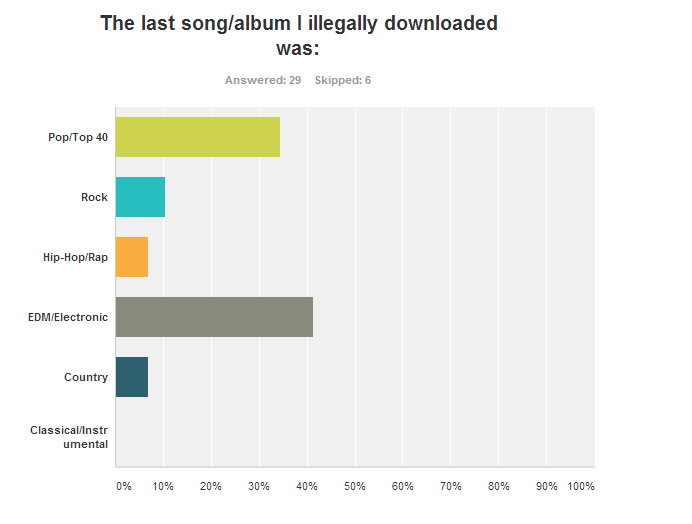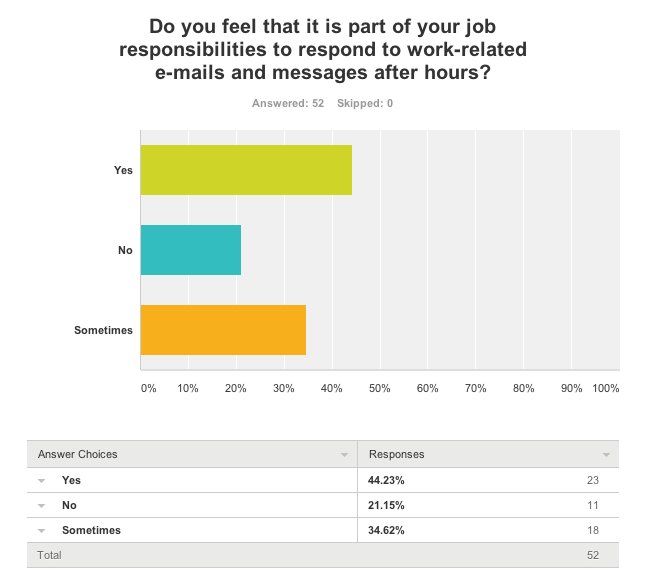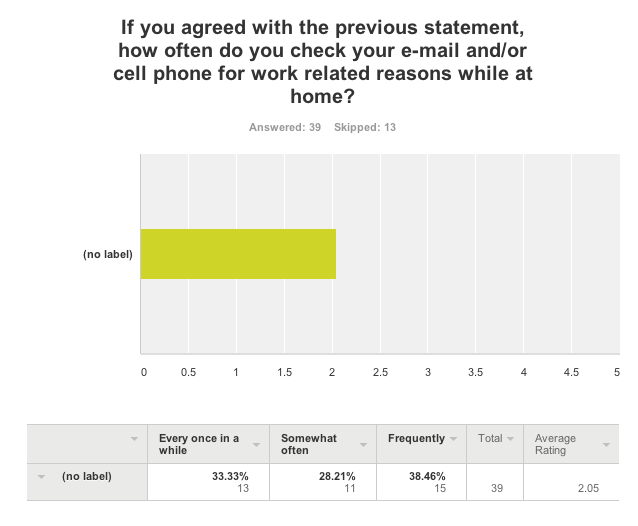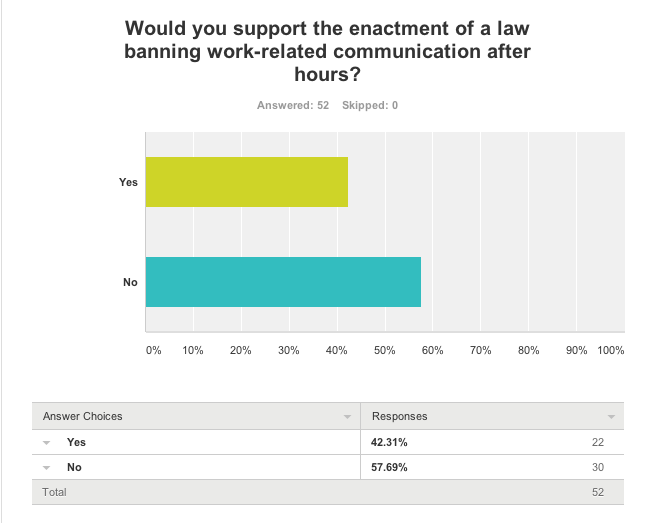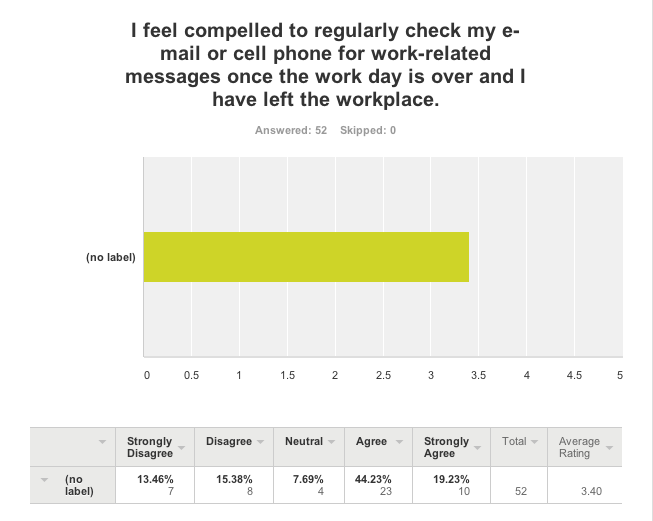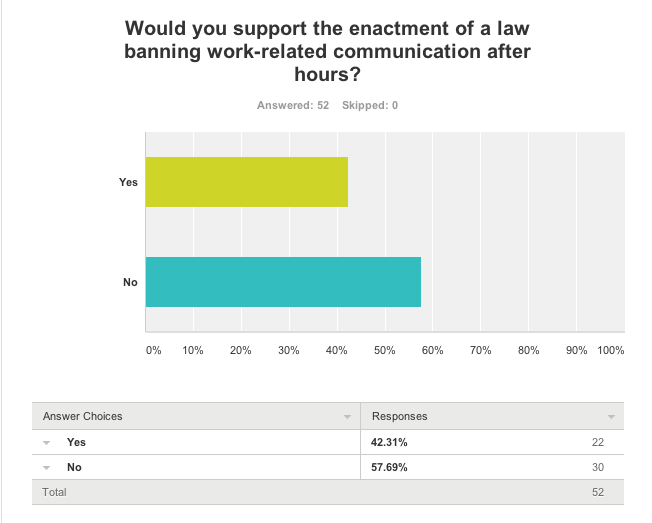Before Digital America (the journal) was a glimmer in my eye, the course Digital America promised University of Richmond students a rather bumpy tour through the history of digital culture and digitization. From the LSD infused Acid Tests of the 1960s to Edward Snowden’s stealth asylum in Russia, students attempt to navigate the birth and childhood of the Digital Age. And, like all identity seeking adolescents, our current era is ripe with contradictions, high highs and low lows, and an uncertain future. Since 2012, students in the class have contributed to a blog [link no longer active], where you can find their final projects. Readers can follow along weekly and take in a few videos and group projects throughout the semester.
Group Project:
How the Digital World has Influenced Music | Team Anonymous
In their group project on illegal downloads and copyright [link no longer active], Team Anonymous explores how students engage music online. “There’s no denying it: people pirate music,” they argue. “Most people know it’s illegal, and many feel at least a little conflicted about it, but it happens. The question is, why?” Anonymous attempted to answer this question by asking students about their music habits online.
Here are the results:
And, they did a survey!
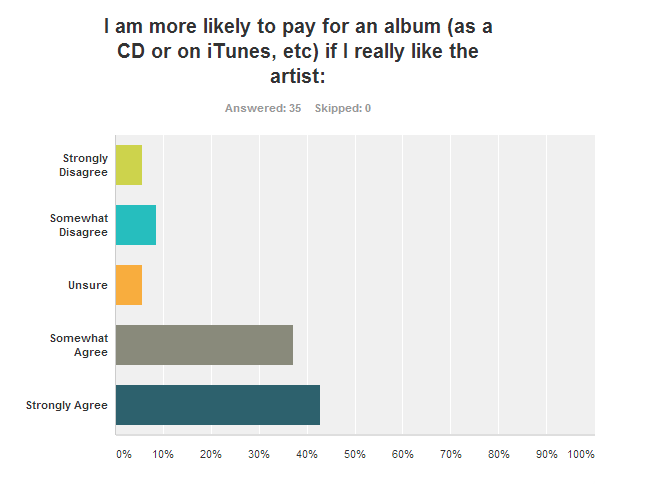
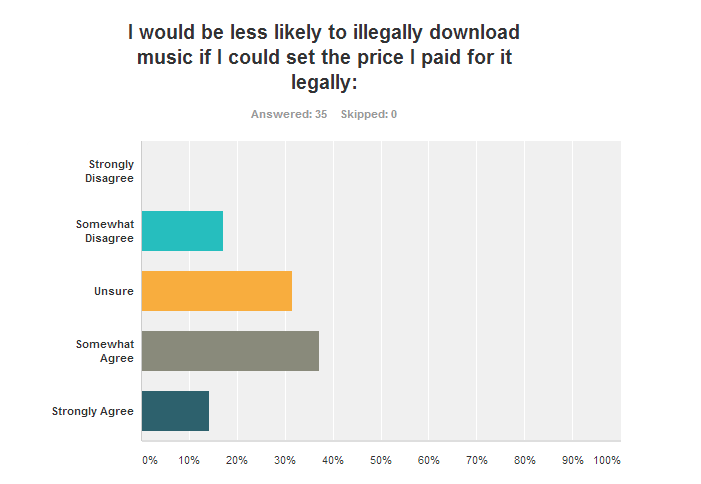
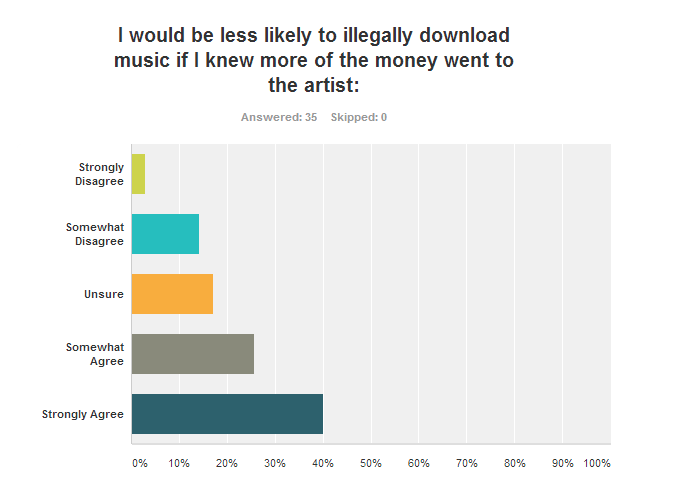
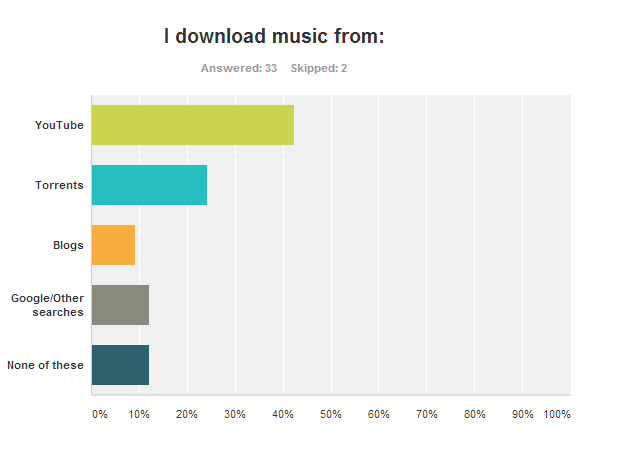
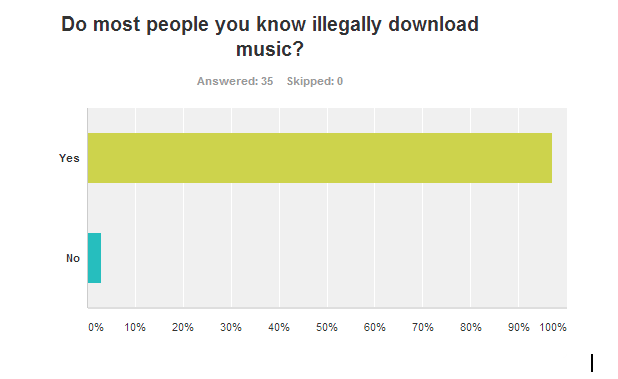
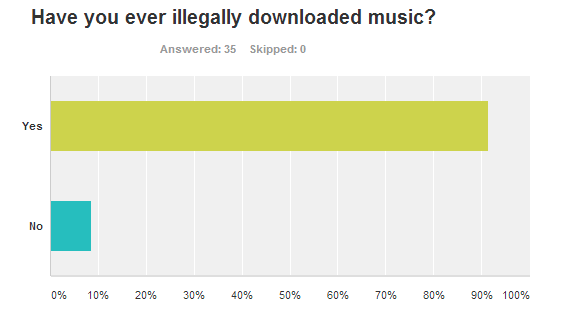
Team Anonymous confirmed some of their suspicions, and they were a bit surprised as well.
Claire: What really compelled me to want to explore the issue of copyright and the laws and regulations that go along with were from the class discussions as well as the article we read detailing the implications of copyright infringement. I had never looked at the music industry, or the media in general, as a cycle of creativity. I never fully understood how it could possible stop the creative cycle and create perhaps a stagnant culture. From the research we embarked on it surprised me to find how little people knew about the activities that they participated in quite frequently. From the various people we interview and the online survey people are illegally downloading music without being fully informed. This project made me more aware of how the copyright laws are hampering creativity and seem to be controlled through huge media outlets and music production companies. I was always fairly pro free downloading and the additional research really cemented this view. Additional things I found compelling were the loss of knowledge in our past actions of our personal music history. I found it very interesting how several people in our on camera interviews stated they don’t even remember ever owning a CD. While this might be true it seems highly unlikely if you claim to be a huge downloader of digital music to have never bought a CD in the past. A few other people stated they couldn’t even remember the last time they purchased a CD. It just shows you how immersed we have become in our digital music collection we cannot even remember a time without it.
Deidre: We felt compelled to investigate this issue because we recognized it as a widespread and growing phenomenon among people of our generation. Additionally, we knew it would be interesting to try to reveal how people feel about illegally downloading and how often they do it. I was not surprised at how many people admitted to illegally downloading, however I was surprised to see how many people knew they could get in trouble for it, but did it anyway. When conducting interviews, a number of people asked who would see the video. Some requested that it not be posted somewhere public and others refused to be interviewed at all.
The results of the survey for the most part didn’t surprise me. However, one thing that was interesting was the correlation between the answers to the question “do you illegally download music” and the question “do people you know illegally download music.” The results appeared to show that that they were almost always answered the same way. This reveals something about our generation: we tend to want to be one in a large group of people. Those who claimed not to illegally download, said that their friends mostly didn’t either. And those who claimed to download all the time, claimed that their friends did too (“i’m not alone”).
The project didn’t change the way I thought about the act of illegally downloading music, but it did change the way I thought about the future of music altogether. I believe that paying for music is a thing of the past. In the near future artists might not even release their music for sales, but rather release it for free and focus on marketing themselves in different ways. The popularity of their music would then be a way for them to make money through appearances and such. Before this happens, though, I think more and more artists will continue to sell the rights to their music to apps like Spotify and 8tracks, where users pay for membership, rather than individual songs. The results from the entire project fuels the prospect that “information wants to be free,” but with music it becomes complicated because the artists’ careers depend on their sales.
Rachel: As a group, I think we all knew from the day we watched “RiP: A Remix Manifesto” for class that our group project would focus on copyright. It was something that we, as an entire group, all had an interest in and different perspectives on. The drive specifically towards music piracy and the future of the music industry happened more organically as we realized that, for most of us, that was the direction that our real interest was headed. Very little of the survey data surprised me, and while the realization that fewer people pirate music in our interviews than I anticipated surprised me at first, the advent of apps like Spotify and 8tracks made it ultimately less shocking. When there are free, legal alternatives to illegally downloading, it makes sense that some people would turn in that direction. Overall, the research undermined my thought that “everybody’s doing it” with regards to music piracy, but it really didn’t change my attitudes towards the practice as a whole. If anything, the fact that most people we interviewed didn’t see anything wrong with piracy fit pretty well with how I think about it. It’s illegal, but its illegality doesn’t necessarily make it “wrong.”
Molly: After our readings on copy right laws, and watching RiP: A Remix Manifesto, the topic of illegal downloading or piracy had been a hot topic on our class agenda. I also think that it is extremely relevant to myself and college campus’ as a whole, as it is a popular practice among teens and young adults. What surprised me most is that people were more aware then I initially thought they were about illegal downloading. Some people expressed concern about answering the questions in our survey out of fear it would implicit them which demonstrates an awareness. I thought many people like myself didn’t realize that YouTube to mp3 is an illegal practice. I think it was also interesting that when we asked whether they thought downloading was illegal, most answered yes, but when we asked them a follow up question, “did you know illegally downloading music is the same thing as physically stealing merchandise from a store?” People would be like wait what seriously?? This illustrates the grey area surrounding copyright and illegal downloading laws. Although we lost some of our footage (including this part) we interviewed a few adults over 40 and asked them if they illegally downloaded and they said no, that they buy from itunes. This just further solidified the illegal downloading movement is very much young, and done mostly be teens, and young adults. I also found that in the mash up culture we live in today, a song is often hot for a short , 15 minutes of fame, and then before you know it there’s a new hit and that song is extinct. I think this is why kids turn to illegal downloading because we want it now, and we want it fast and often times these mash ups and remixes don’t have enough time to get onto itunes so kids turn to YouTube or music blogs to get the link to the new song. We also were able to interview a girl from Hong Kong, (lost this gootage too) but she said that illegally downloading music in japan is huge! And that there is little to no education on safe downloading etc. this is interesting because its not an American problem, but rather a global issue. The project didn’t change the way I look copyright and downloading. If anything, it just made me feel more frustrated at the laws, and solidified my opinion that it is time for reformation.
Class Project: Collaboration with Tecnológico de Monterrey
Now that our feet are wet with the class [link no longer active], DA students had the opportunity to collaborate with students attending Tecnológico de Monterrey (TEC), one of the most recognized universities in Mexico and Latin America that was coincidentally the first Latin American university to connect to the Internet. Led by myself and Dra. Gabriela De la Paz Meléndez in her course North American Regional Scenarios, students were tasked with writing a blog post and creating videos in response to articles about Edward Snowden, Wikileaks, and American diplomacy. (The UR students were also asked to get up to speed on Steven Levy’s recent piece in WIRED on “How the NSA Almost Killed the Internet.”) The various perspectives are intriguing and shine a light on how national interests shape the complex debates on internet security. Here are some excerpts from the dialogue:
“As the article about Leaky Geopolitics says, the bad guy is not only the US Foreign Policy, but also the whistleblowers are risking the security not only of nations, but also of people, when exposing secret documents. But, if the costs are to completely ignore and even damage the principles of self-determination of people, privacy and freedom of speech, then well I admire all the whistleblowers everywhere in the world. Transparency in the actions of governments is a fundamental concept in 2014, and we cannot change it in the name of the democracy.”
–Alessandro Giorgi, TEC, “Freedom of speech vs National security” [link no longer active]“This is how information should be provided to the people, by our own government not by individual actors motivated by private agendas. While it is important to have oversight on our government and to hold them responsible for their actions, we do not believe that hacking and leaking is the most efficient and legitimate way to go about this. Hacking and leaking does not provide for any formal structure to prevent issues exposed by hackers from happening again. It simply gives instant gratification to those who feel that an injustice has occurred. This is not the way to build a safe and product society.”
–Eliza, UR, “Protesters or Pirates (Tec Collaboration)”“If one State has the chance to have control over all this information, it will not let that opportunity go away without taking advantage. We have seen the same situation in different times through history; during the colonialism, the great powers wanted to have control over territories, with the imperialism happened the same but with economics, and now with the internet it is not unexpected the States want to control it to ensure their security. Saying this, I’m not implying it is a justified action, but it is hard to make the governments not to do it. I believe that if the States want to control the internet, it could be understandable, but as I already said, not justifiable. If the State won’t set free some secret information, I think it should respect the privacy of the citizens.”
–Raúl Ochoa, TEC, “National Security vs. Internet Privacy”“I respect Wikileaks attempts to keep the government honest by knowing that they cannot do whatever they want in complete secrecy, but I worry about the harms Wikileaks poses to the American public. One day they could choose to leak a piece of information that is truly determinantal to American society, and then their efforts to provide a system of checks and balances has turned into a very hazardous situation. My opinion, if you really want a better way to keep our government accountable for their actions, then lets find a more structured way to do it.”
–Cassaundra Fincke, Kevin Carney, Sarah Crawford, and Emily Narduzzi, UR, “Snowden, Wikileaks, and Global Debate (Tec Collaboration)”
Response to “National Security vs. Internet Privacy” – Mia Webber
Video is no longer available.
The Issue of Internet Security by: Aranzazu Ballesteros, Anais Sánchez, Roberto Alviso, Estefanía Garza, Fernanda Rodríguez, Raúl Ochoa, Carlos Escalante, Samantha López
Intrigued? You can read all of the posts on our blog under the tag Tec de Monterrey.
Group Project:
Dating in the Digital World | Team Rocket Power
In their group project called “Dating in the Digital World,” Team Rocket Power studies digital technology’s influence on relationships. They argue that because it is nearly impossible to find a relationship that is “exempt from digital culture,” there is a need for moderation due to technology’s inability to replace good chemistry and mutual affection. “In any relationship, long-distance or not, technology has become a 3rd partner,” says Cora, one of the members of Team Rocket Power. “It progresses the relationship at a faster pace.”
Each of the three groups in the class can choose any topic and approach it in any way. The field is wide open. Here is how Rocket Power settled on their topic of relationships:
Mia: “When posed with the idea of a group project to bring together some of the ideas we’ve been talking about in class, my group immediately tried to think of something timely and relevant that we could explore through the scope of the course. With it being February, we immediately thought about Valentine’s Day and romantic relationships. We got excited to look at the effects of technology and social media on relationships because it is so prevalent in our daily lives; whether single, dating, or in a committed relationship, everyone seems to be so open in sharing their lives on the internet, especially in the college-age range, that it’s hard to ignore. Our findings weren’t all that surprising, but it was really interesting to get a deeper perspective on how technology plays a role in our relationships.”
Piper: We started with the idea of the role of social media in relationships, considering Valentine’s Day is the highlight of February, and researched stats that we could base our project off of to add some substance to our arguments. To open the discussion about the pros and cons of relationships and social media, we decided to survey students around Richmond to see how social media played a role in their Valentine’s Day. We received mixed responses, which proved to be a perfect segue into our videos we created– the first one being the pros of social media, with long distance relationships being the prime example, and the second one being the cons of social media, perhaps in a more closely knit community (such as Richmond). Under each video, we described what the situations revealed and backed up our statements with outside research and assigned articles. Our project mirrored the Turkle vs. Tufekci argument about how/if technology is beneficial– we did not come to a conclusion, but rather demonstrated both sides of the argument. Doing this project, we went back and forth about the pros and the cons in each situation, which just reinforced the idea that the role of social media in our lives depends on the situation and the approach.
Rocket Power on relationship anxiety and technology
Eliza: Our group approached the project by first throwing out all of the different ideas we had regarding Valentines day and how social media impacted it. We then realized that technology applications such as FaceTime, Skype, and Facebook really play a key role within relationships, no matter the distance. After jotting down notes on a whiteboard and then meeting the next day and playing out each scene before we acted it out, we knew the direction we wanted to head. The videos went so well. We really captured what we wanted to and the message we wanted to send was visibly there. Our whole group worked equally as hard and I had a blast doing it.
Cora: Going into this project, I had a very strong opinion on the use of technology in romantic relationships. To be honest, I’ve always felt that it is no substitution for real contact and conversation and, in past relationships, I have opted to take time apart rather than try and make it work via long distance. In doing this project, reading surveys and articles and orchestrating interviews, it has become overly apparent just how ingrained in our society technology and social media is. I have always been somewhat skeptical of long-distance relationships, but I’ve noticed how much more comfortable my generation is with the idea, due to technology. In any relationship, long-distance or not, technology has become a 3rd partner. It progresses the relationship at a faster pace as it always you to communicate 24/7 as well as share aspects of your personal relationship with the world. I do not have a Facebook, Instagram, or Twitter, but that doesn’t really change how much I hear about and see its presence in my day-to-day life. It comes down to personal choice and opinion, especially when dealing with personal, romantic relationships. Even the most personal aspects of individuals’ lives have become “digitalized” and I think that is only going to become more common.
Click here for the entire project–more skits, interviews, and research.
Group Project:
The Separation of Work and Play | Group 3X’s & 1Y
In their group project, “The Separation of Work and Play,” group 3X’s and 1Y dove into the world of extended work hours in our new economy. The group states, “ Not having enough hours in the day has become normal, and the American job industry has become so competitive that if you don’t want to put the time and effort in, someone else will.” They polled the class, and some of the students and faculty at the university, to find out how they felt about the disappearing line between work and play. Here are their results:
3X’s & 1Y Acting out Work and Play:
Emily: During a group discussion one day, our teacher mentioned the recent enactment of labor laws in Germany, in efforts to establish more of a clean line between the work place and personal life. This sparked my interest because at that point in the course I did not think an event like that would happen so soon. I also was interested to see how Germany’s work force compared to the United States,’ and I was also interested to find out if Germany’s bold move had created some sort of domino effect on other countries. Additionally, our group being all seniors made us more curious to think about life after college, as we are close ourselves to entering the workforce. We all had somewhat of similar opinions (I am happy I am not alone in being hesitant about how to balance work life with personal life). It was fun to role-play as different types of people (student intern, working mother, motivated and aspiring young businessmen) and to develop their outlooks on how they would respond if Germany’s new labor laws were passed in the US. I think we did a great job of portraying realistic and accurate views dependent upon the type, age, and motivation of that person. I was also able to explore my own personal opinion… in which I would agree with the student intern. As I become closer to entering the work force, I hope and will try my best to keep work at work.
Kevin: I believe what made us decide on this topic was our interest in how constant attachment to mobile devices has affected our own lives. Especially considering how close we are to entering the professional world, the issue of using phones after hours is pretty relevant to our own lives. The experience for me was actually quite shocking. Seeing how attached individuals are to their phone and learning how mobile devices can add a month in a half of work hours per year done after leaving the office. In many ways, it was scary to think how many of us really have entered a 24 hour work cycle. In essence, I learned that we must take measures to limit our attachment to and constant availability caused by mobile devices. It is actually unhealthy for individuals to be always available to the work place, and individuals need some separation of work and leisure in order to maintain work-life stability. However, it is becoming increasingly expected to be always available to the workplace, which means we must make the effort to lessen this practice before it becomes an engrained expectation of society.
Cassaundra: We decided to do our project on the separation of work and play because as a group of two seniors and two juniors, we are getting very close to entering the workforce and are concerned about finding the proper balance between our work and personal lives. At Richmond, we have grown accustomed to constantly checking our e-mails for messages from professors, sororities, fraternities, and other organizations. Needing to be this “plugged in” in college made us wonder if this will continue and increase in the “real world.” As we expected, being accessible via e-mail after work hours is a common expectation based on our survey results and research. However, we were somewhat surprised to learn that many people view this as a necessity and would not support any legislation that banned work related communication after hours (such as what was recently passed in Germany). It seems that despite the need to be accessible for work while at home, people manage despite the varying degrees of impact this has on their personal life (the impact varies among ages and level of their position).
Course Stats
Professor: Meghan Rosatelli
Institution: Program in American Studies @ The University of Richmond
Course: Digital America
Project: The whole course is a project, so jump in!
Participants: 12 students split into three groups (Anonymous, 3X’s + 1y, and Rocket Power)
Some Readings/Viewings:
- From Counterculture to Cyberculture: Stewart Brand, the Whole Earth Network, and the Rise of Digital Utopianism by Fred Turner
- Information Please: Culture and Politics in the Age of Digital Machines by Mark Poster
- WIRED magazine
- RIP: A Remix Manifesto

